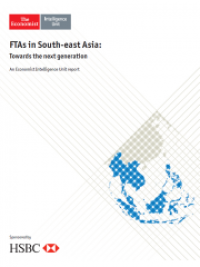FTAs in South-east Asia: Towards the next generation is the second in a series of reports sponsored by HSBC that examines Asian businesses’ attitude towards free trade agreements (FTAs) and usage of their provisions. The report is based in part on the findings of a survey conducted in the first quarter of 2014 that included 400 exporters from four countries in the Association of South-East Asian Nations (ASEAN)—Indonesia, Malaysia, Singapore and Vietnam—representing a range of industries.
Among its key findings, the report examines how the low usage rate of FTAs among ASEAN exporters is connected to the issue that many existing FTAs are “unambitious”—that is, they rarely go beyond simple tariff cutting to address issues such as trade in services, e-commerce, intellectual property rights, customs cooperation and other regulations that hinder trade—which means companies see limited upside in using them.
Consequently many ASEAN businesses have high hopes for the next generation of “mega-regional” pacts now under negotiation, including the Trans-Pacific Partnership (TPP), and the formation of the ASEAN Economic Community in 2015.
The report also finds that the liberalisation of trade in services is crucial to economic growth in the region. As supply chain fragmentation across ASEAN increases, trade becomes increasingly dependent on logistical, legal, financial and other services, which account for an increasingly large proportion of the value of goods shipped across borders. Better access to quality services would also help businesses expand into other markets.
Download the full report here.
Key findings:
- On average, each of the existing FTAs signed by countries in ASEAN is used by just 26% of exporters. Even the agreement covering free trade between ASEAN countries is used by only 50% of exporters, on average.
- 81% of exporters in ASEAN see it as important that their governments sign FTAs with more comprehensive provisions, rather than just cutting tariffs, while 77% want FTAs with larger economies.
- The low usage rate is partly down to the complexity of the terms of the agreements, according to 48% of respondents.






